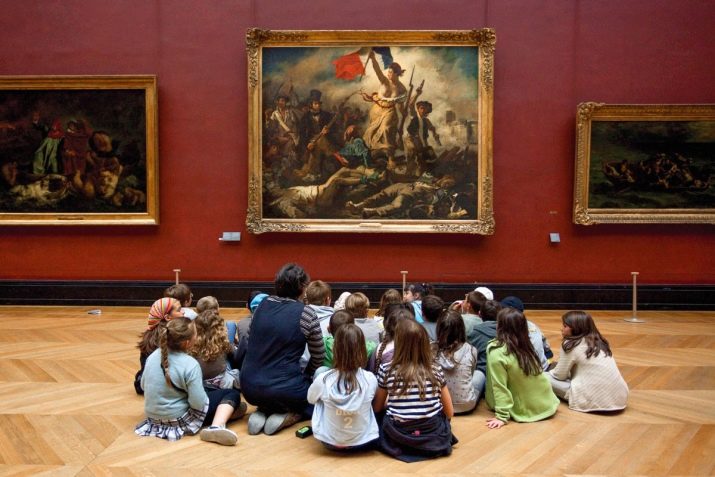Etiquette rules for children

All parents dream of having their children well-mannered. However, it is pointless to expect your child to follow the rules of etiquette. This moment is unlikely to come. The main responsibility of parents is to teach their child these rules of decency. And children should clearly follow them, as they are full-fledged members of society.
A child learns the principles of good behavior from birth, but realizes this only at the age of 3-5 years. Parents should tell the child in time what is allowed and what is forbidden to do. If the child is well brought up, then you will not have to blush for him at a party. When a child goes to kindergarten or secondary school, understanding the basics of etiquette will be very helpful.


What it is?
Parents should explain to their children what "etiquette" is, because for kids it is the same common word as everyone else, and it does not mean anything to them. An explanation of the definition of this word must begin with the fact that these are certain rules. After studying them, your child will learn to behave correctly with peers, elders, at a party, with strangers, and adults will respect him.
First you need to teach your child the following rules:
- Always remember to greet.
- Become cultured at the table and in public places.
- Respect your elders and not interrupt them.

For a child, the rules of etiquette are a rather abstract concept. Therefore, he needs to give examples: who is a well-mannered person, and who is ill-mannered, and what distinguishes them.
Children need to be taught that at the heart of every good manners is humanism: you need to be respectful of everyone around you.

Role in parenting
The norms of behavior play a big role in the upbringing of children, thanks to them, the child will find it easier to navigate in different life situations, learn to smooth out many conflicts. After all, children often quarrel over trifles.
Children receive basic information on how to behave in a given situation simply by observing. Therefore, the main place for studying etiquette is the family. Your child will treat everyone he knows the way it is at his home. Relationships between loved ones are completely projected onto the child.

Parents should set an example for their children by fostering attentiveness to those around and courtesy to everyone around them. To do this, you can simply show them that the elders need to give way, and the girls need to be skipped ahead. It is advisable to use the following words:
- sorry, I beg your pardon;
- please, thank you very much;
- bon appetit, be healthy;
- good morning good night.
After each situation he sees, the child will begin to get used to this friendly atmosphere and politeness in general. Surprisingly, children who have just learned to speak utter all those polite words that they have heard from their parents before.
If polite words become a natural atmosphere in the house, then the children will not even need to teach them, they themselves will take all the necessary expressions from their parents.

After children enter society, they must socialize, and only adults can provide help, setting themselves up as an example, reading fairy tales or explaining different situations. This is the basis in the development of a cultured person who can adequately get out of the most difficult situations in life, without getting into awkward situations. Parents begin to teach this at a very early age, asking their baby to wave a hand goodbye and say "bye-bye." Before sending your child to kindergarten, he needs to be told that elders are addressed by name and patronymic and “you”.
Children are negative about various teachings. If the child is constantly under edifying supervision, then he is unlikely to listen to you.... That is, the more strictly you monitor his behavior, the more stubborn he will go against you. Therefore, when teaching children, you need to resort to elements of the game.
For children, your words are not enough. The child must be shown and told why it is necessary to do it this way, and not in another way. It is preferable to teach the norms of behavior indirectly, and not in direct text, so that the child himself wants to follow them. For toddlers who have not yet learned to read, fairy tales and games are considered the best way to instill norms of behavior.
You can just play some situation with the child's favorite toys several times, for example, getting to know a new toy or saying goodbye to an old one, the child will easily project this rule onto himself.

Likewise, you can teach children about the rules of behavior at the table, etiquette in public transport or the hospital. For those who love fairy tales, you can resort to existing ones or come up with your own story. An excellent example is the book "The Magic Word" by V. Oseeva.
Children's tales and stories are always instructive, children usually imagine themselves in the role of the main character and can themselves compare where the main character did the right thing and where he did not. You should ask the child questions from the moments in the story so that he gives answers to them. You can create an endless variety of stories based on your favorite toy or cartoon character. In this case, it all depends on the imagination of the parents.
The best fairy tales that help to master the norms of etiquette are those in which the characters, having committed bad deeds, reflect on them and correct them. You can use the rules written in poetic form. A good guide can be considered the work of Grigory Oster, who composed "Harmful advice".

With the help of the game, you can teach the rules of etiquette and teenage children.For example, write on a piece of paper some of the rules, the continuation of which the children must add themselves. According to psychologists, the earlier children realize how to behave, the more successful they will be in the company of their peers.
The main principles that interpret the rules of behavior in society for children are good deeds and democracy in communication. A person who has mastered the etiquette of speech well always has many companions. In this case, the child will be happy to go to kindergarten.
Whether the child knows the basic principles of behavior in society depends on whether he is ready to go to school or not. If children do not know how to communicate correctly, then it will be difficult for them to become successful and achieve the required tasks, as well as to determine the choice of a profession.
To teach a child to follow the rules of etiquette, adults themselves must adhere to them. All lessons will be useless if the parent does not set the right example.

Classification
The most surprising thing is that children begin to learn the rules of behavior before 1 year old, from the moment of the first feeding at the table, when the babies are given a small spoon so that they try to eat themselves.
At preschool age, children should learn the following rules of table etiquette:
- All types of cutlery should be used wisely. To begin with, you just need to clarify that the first dish should be eaten from a deep plate, and the second from a flat one. Provided that the child is not left-handed, he should be taught that a knife is held in his right hand and a fork in his left, but not vice versa. After he is a little older, teach your child how to use a fish knife and other sophisticated tools. So the child will be able to fully study the serving.
- Sit upright at the table. For the child to quickly remember this rule, he must have a home chair that matches his height.
- "When I eat - I am deaf and dumb" - this proverb is very appropriate. You can't play at the table and talk with your mouth full.
- Do not spread food all over the plate. This is not characteristic of a well-bred person. You need to eat carefully.
- It is uncivilized to fill a mouth full, food should be divided into small pieces.
- If the dish is far from the child, then he should not reach for it to the other end of the table. You can simply ask to submit it.
- Do not put your elbows on the table or take toys with you.
- Wipe your mouth with a tissue only.
- Remember that before a meal you need to wish you bon appetite and thank you at the end.

During a visit, you need to use the following rules:
- You need to come to visit, having notified in advance, or by invitation. A sudden appearance will not be very pleasant.
- You cannot persistently ring or knock on the door. The maximum number of permissible knocks or calls is two.
- You can’t go on a visit “with nothing”; you should have any present, even a small one, with you.
- From the doorway you need to say hello.
- When visiting, you need to be restrained and calm. It is forbidden to touch other people's things without the permission of the owner, as well as run around the guest room, shout, climb on closets.
- If you want to take a closer look at a souvenir or a photo, you need to ask the owners for permission.
- Before leaving home, thanks to the hosts for the good welcome.

While walking on the street, children are surrounded by many people. The child should not give them discomfort:
- In order not to hurt people who are walking towards you, you need to move only on the right side of the sidewalk (right-hand traffic rule).
- Garbage must not be scattered. There are special urns for candy wrappers and similar things.
- It is indecent to point your finger at people.
- Stopping in the middle of the sidewalk, the child blocks the way for all people walking behind. If you need to stop (tie a lace, etc.), it is better to step aside.
- If you meet friends on the street, they should be greeted.
- You can't talk to strangers and leave with them.
- It is advisable not to eat on the go.If you bought ice cream, then it is better to sit on a bench and have a quiet meal.

When visiting public places (cinema, museum hall), you must also follow the rules of etiquette, otherwise, such a time in the museum will turn into a nightmare for parents:
- You can't be late for the show. It is forbidden to appear in the auditorium in the hall after the third ring.
- Jackets, hats, coats cannot be brought into the hall. There is a special place for them in the wardrobe.
- If someone wants to pass in front of the child, then he should rise a little and let the person pass to the place he needs.
- If the row is busy, people are sitting in the chairs, and the child needs to go through, then you need to make your way to your seat with your back to the stage.
- You cannot take other people's places. For each person, the seat is marked on the ticket.
- There is a buffet for food and drink, which you can go to during the break.
- Talking is prohibited in the theater during the performance period.
- It is indecent to push in queues.

How to educate your child?
Before teaching boys and girls the rules of etiquette, it is necessary to instill family and human values from childhood. Let's look at the main nuances of this process:
- In everyday life. First of all, it should be remembered that children will always be like their parents. Therefore, you need to educate yourself first.
- While reading books great people and studying their biographies. While reading books aloud, one should focus on the bright moments of this story, compare children with the main characters, motivating them to educate themselves. There are a lot of such examples. Ethical books raise children with a kind heart.
- While watching movies and going to the theater together... It is best to think in advance about which films you plan to watch and highlight certain points in them that will later be dealt with with your child.
- While interacting with children and through games... Everything is simple here. You can just tell on behalf of your favorite toy that during the request you need to add "please", and when we say goodbye, say "goodbye". You also need to explain how to properly speak on the phone, give and receive gifts.
There is also the ethics of interethnic communication, it should also be given special attention.
No matter which method you choose, you cannot completely place the responsibility of parenting on nannies.


Key messages: memo for every day
There is a proverb: "do not have 100 rubles, but have 100 friends!" If you want your child to have many friends, you should give him some tips:
- You can't be rude to friends, raise your voice to your comrades, laugh at their failures. So you can offend them very much.
- When attending a concert or theater, the child should remember that there is special clothing in which to go to such events. Your appearance should be approached with due responsibility so as not to look like a black sheep. You cannot come to the theater in sneakers or shorts. Young gentlemen should wear dark suits, little ladies wear pretty dresses.
- Before the onset of the holiday, many children are at a loss. The best gift is a handmade gift. You need to explain this to your child. He can draw or embroider something. On your parents' birthday, you can learn a rhyme or sing a song.
- Older children can buy a gift for a friend at the store. But you must definitely ask adults for help in choosing.


You will learn how to behave at the table and other rules of etiquette for children in the following video.








